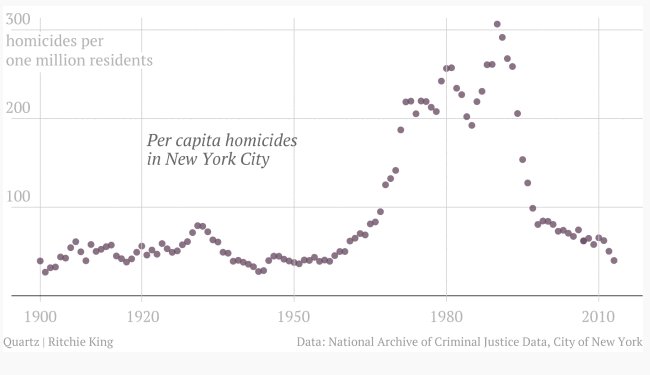You are using an out of date browser. It may not display this or other websites correctly.
You should upgrade or use an alternative browser.
You should upgrade or use an alternative browser.
[RD] Daily Graphs and Charts
- Thread starter Winner
- Start date
- Status
- Not open for further replies.
Lohrenswald
世界的 bottom ranked physicist
So what's the story?
Hygro
soundcloud.com/hygro/
Leaded gasoline.
So what's the story?
In the US, basically in the 1950s the average person in the cities started to become much poorer. This was the result of white flight, where much of the white middle and upper class population left the cities for the suburbs. So increasingly the city populations were poor and black. Jobs also left the cities. Leaving the population even poorer, and with no prospects. The cities were abandoned by the state and federal government, and conditions there became worse and worse. So as a result crime in the cities became much worse. In the 1980s people with good jobs started to return to the cities, and the cities as a whole improved, and crime began to decrease.
Hygro
soundcloud.com/hygro/
What does leaded gasoline have to do with anything?
(or is there a graph I'm not seeing?)
One of the best leads we have for explaining the rise and drop in violent crime.
Ah, yes, there is a striking correlation there, but the causal link seems to be missing
The lead is neurotoxic, leading to lower IQ and more importantly, reduced impulse control. During the late teenage/early adult years, males are already easily affected by impulse control issues. Lead damage aggravates this, leading to more criminality.
IIRC, getting lead out of the gasoline accounts for something like 25% of the reduction overall. The anti-environmentalists were essentially pro-crime on this front.
Samez
Emperor
- Joined
- Jan 31, 2005
- Messages
- 1,643
Leaded gasoline was abolished much later in the EU (2000) and the homicide rates are still lower... I once heard that the late abolition of lead might have cost us an average of about 10 IQ points.
Cutlass explanation sounds reasonable and in the end it's probably the combination of several reasons.
Cutlass explanation sounds reasonable and in the end it's probably the combination of several reasons.
stfoskey12
Emperor of Foskania

This one is from 1997, I think. I wonder if anyone has more recent (or more specific) data?
It's sort of interesting, but hard to compare, since so many schools were built from 1950-69.
"United States Olympian Michael Phelps has equalled the record for Most Individual Olympic Victories (12), previously set by Leonidas of Rhodes, 2168 years ago".
http://www.goldcoastbulletin.com.au...s/news-story/8ac1b75590ab466bac232ee034dd906c
*
I wonder what Leonidas of Rhodes would have done with access to Phelps' drugs
http://www.goldcoastbulletin.com.au...s/news-story/8ac1b75590ab466bac232ee034dd906c
*
I wonder what Leonidas of Rhodes would have done with access to Phelps' drugs

JohannaK
Heroically Clueless
Get wasted and ruin his career.
gay_Aleks
from the river to the sea, Palestine will be free!
pick up hot girls/boys
probably more on the "boys", being in Ancient Greece
probably more on the "boys", being in Ancient Greece
- Status
- Not open for further replies.
Similar threads
- Poll
- Replies
- 120
- Views
- 8K





